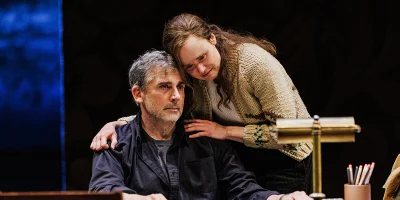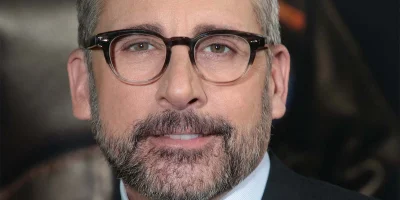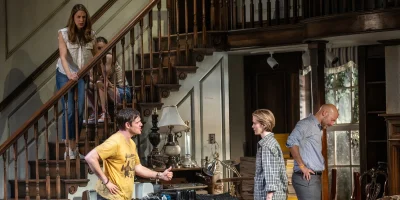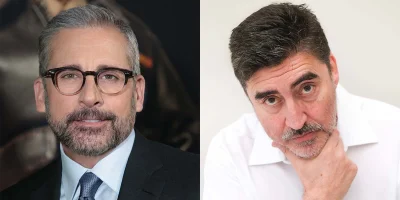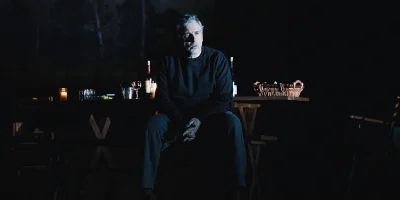
William Jackson Harper on finding himself in 'Uncle Vanya' on Broadway
The versatile, Emmy Award-nominated The Good Place star is now a Tony nominee for his performance in a classic play that resonates with modern audiences.
William Jackson Harper may be known for his Emmy Award-nominated performance as the lovably anxious Chidi Anagonye on The Good Place, but he's been acting on stage long before that NBC show made him a household name.
An actor who describes his theatrical taste as "a little left of center," Harper launched his career doing new, Off-Broadway plays. Perhaps that's no surprise for an actor who grew up in Texas and could not afford to go to Broadway for years. He has since made his Broadway debut (in 2013) and added multiple Shakespeare shows to his resume, but scrappy productions remain his go-to.
"These older classics that are part of the canon — that's something I never really thought I'd get invited to do much of," Harper said.
Ironically, he said this while speaking about his 2024 Tony Award nomination for his second Broadway gig: playing the sensitive, environmentally conscious Dr. Astrov in Uncle Vanya, an 1897 Anton Chekhov drama about people dealing with unhappiness in their lives. Playing at the Vivian Beaumont Theater through June 16, the production also stars Steve Carell in the title role.
This Uncle Vanya marries both of Harper's theatrical worlds: The play may be a classic, but this revival features a contemporary translation by playwright Heidi Schreck and direction by Lila Neugebauer, both known for versatile, daring shows on and off Broadway akin to Harper's early-career work.
"Lila and Heidi are really interesting creators, and they have a sense of irreverence that I really enjoy," Harper said. He also shared what he loves about this revival and his character, how theatre and TV differ, and a Tony Awards performance that inspired him.
What interested you about this production of Uncle Vanya?
We did a read-through of Heidi's translation, and something clicked [...] the play made a lot more sense. Reading Chekhov when you're in your 40s is different than reading Chekhov when you're 22. Some of the things about regret and wasting your life — "What have I done? Who am I now?" — I'm like, "Oh, no." It's different. I was just really curious what that could be, so I said yeah, I wanted to do the play.
What about Dr. Astrov?
I lived with all these dudes in Brooklyn in this apartment. I was the oldest, but everyone was late 20s, early 30s. We were all watching everyone else become stable, and we were not. There was something about that "home for wayward boys" which we had concocted that reminded me of this character.
I have a strong fondness for that time, and there's something about the doctor that feels like that guy, that time in my life. Being a little bit more confused and a little uncertain and realizing my life is looking a little bit different from what I had hoped.
What would you tell audiences unfamiliar with Chekhov, or who don't think his plays are accessible to them, about this production?
These are just people. The way that we're doing this play, they're just people living in a rural area. There's nothing about it that is meant to be distancing in any way. It's meant to invite everybody, and it's meant to feel familiar.
These are farmers; these are country doctors; there's an academic who can't afford to live in a city, so he moves back. This could be any one of us, as opposed to someone who perhaps has some high rank or used to be a star or [is] a great landowner who has fallen on hard times.
These are people who just made some decisions, and they are in the place they're in right now. Some of them didn't make the [decisions] that landed them where they are.
How is doing a play different than acting on TV?
Theatre's my community because that's what my career's mostly been until the last eight years or so. I love rehearsal so much. I love going into a room and making terrible decisions and trying something different the next day and trying to find something surprising but inevitable. Theatre allows for that. When that work is received in a way that I meant it, it's really wonderful.
TV is a lot of fun in its own way. I enjoy that; I want to do it again, obviously, but so much is left up to other people once you've done your work. When we're on stage, it's us and it's the audience. We're all in the room together having an experience, and we're guiding that ship.
When it comes to TV or film, you do the thing on the day and then someone else will edit it, and who knows if the tape that you liked, the one you felt the most grounded in and sure of, is the one they're going to use?
Do you have a favorite memory associated with the Tony Awards? The annual broadcast is many people's introduction to Broadway.
One that I remember from college, actually, that we all watched a lot was Brian Dennehy doing Death of a Salesman. I was like, "Wow, that's a crazy performance." And that was back when I didn't get to see plays on Broadway, and also, I didn't live here. I was in New Mexico at the time. So that was something that opened up my eyes to how plays can feel in a Broadway house.
Frequently asked questions
What is Uncle Vanya on Broadway about?
This Chekhov classic returns to Broadway in a new translation by Pulitzer Prize finalist and Tony Award nominee Heidi Schreck. See this time-honored story anew, following a family whose lives get upended as they struggle with unrequited love and unfulfilled potential.
Where is Uncle Vanya on Broadway playing?
Uncle Vanya on Broadway is playing at Vivian Beaumont Theater - Lincoln Center Theater. The theatre is located at 150 West 65th Street, New York, 10023.
How long is Uncle Vanya on Broadway?
The running time of Uncle Vanya on Broadway is 2hr 25min. Incl. 1 intermission.
What's the age requirement for Uncle Vanya on Broadway?
The recommended age for Uncle Vanya on Broadway is Ages 12+. Children under 5 years old will not be admitted..
How do you book tickets for Uncle Vanya on Broadway?
Book tickets for Uncle Vanya on Broadway on New York Theatre Guide.
Who wrote Uncle Vanya?
Renowned classical playwright Anton Chekhov wrote Uncle Vanya, and Tony Award nominee Heidi Schreck translated the play for the 2024 Broadway production.
Who directed Uncle Vanya?
Lila Neugebauer directs Uncle Vanya on Broadway in 2024. Her productions of The Waverly Gallery on Broadway and The Wolves off Broadway earned critical acclaim.
Is Uncle Vanya appropriate for kids?
Uncle Vanya is best for teens and adults and is not recommended for young children. The show has complex adult themes and emotional conflicts that may not be appropriate or interesting for young viewers.
Is Uncle Vanya good?
Uncle Vanya stands the test of time. Its themes of unrequited love and struggles with unfulfilled potential have resonated with today's audiences as much as those of its premiere over a century ago.
Originally published on

